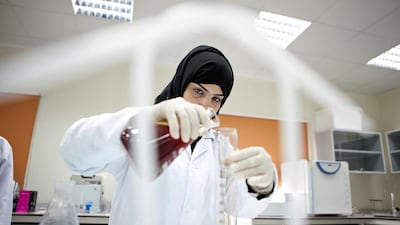This year, the Organisation for Women in Science for the Developing World, an international organisation and a programme unit of Unesco, celebrates 30 years of working with talented and determined women from parts of the globe described as LDCs or Least Developed Countries. But the accomplishments of its female fellows are impressive by any standard.
A handful of the organisation’s members were in Doha last month to attend the fifth UN LDC5 Conference. Through moving and powerful stories, three women from the Republic of Congo, Nepal and Yemen described how they overcame challenges to become founders of national academies of science in their countries, heads of departments and successful entrepreneurs.
Maryse Nkoua Ngavouka, aged 36, returned to Congo Brazzaville after receiving grants and fellowships in Italy to set up a grid system that supplies electricity to a small island that is otherwise cut off from the mainland, and where people had to travel in boats to get to the chemist's for tests during the Covid-19 pandemic. Maryse is now adviser to the Minister of Science and Technology in Brazzaville.
Prativa Pandey, 36, explained how her research in Nepal on transforming citrus waste into health and beauty products has allowed her to set up a thriving business. And Fathiah Zakham, 44, told a moving story of how her country, Yemen, supported her undergraduate and postgraduate studies in Iraq and Morocco.
She said she was very happy to return to Yemen in 2015 to continue her research on the emerging infectious diseases ravaging her home country. But soon after her return, conflict broke out and she was forced to leave. Fathiah is now a researcher in Helsinki, Finland but still hopes one day to return home.
More than 150 Early Career women have been awarded fellowships and awards. These have raised their visibility at home and abroad, as well as opening doors for themselves and younger women who are inspired by their strength and success.
More than 9,000 female OWSD members are based in more than 100 countries. More than 360 female scientists have graduated with doctorates and 87 women have been awarded Early Career fellowships to establish research centres of excellence in their home institutes.
Over the past 30 years, OWSD has identified places in the scientific career pipeline where women are likely to get stuck or drop out. It is at these moments that women need the support and flexibility to stay on to complete their academic pursuits.
Although the average dropout rate for PhD graduates, male or female, worldwide is 20 per cent, since 1997 only 10 per cent of our doctoral fellows have dropped out. Also impressive is the fact that whereas the average completion time for science, technology, engineering, mathematics (or Stem) PhDs in the US is eight years, the average rate at OWSD is 4.5 years.
The challenges that women face in the field of Stem are well-known but they are worth repeating. In many parts of the world, the common expectations are that a woman’s place is in the home and not the laboratory; that women are the primary carers for children, the elderly, the sick and mobility-challenged.
There are pervasive notions that women’s work is to prepare the food, clean the home and educate the children; that women need not just the support of men, but often even their permission – to travel abroad or go to college. Women in many developing countries often do not have independent incomes to support their academic pursuits.
And because of childbearing duties, women are more likely to take leave from work for health-related and childcare related issues. And yet, there is much evidence to suggest that it is these very challenges that make women not just ideal but essential researchers in Stem fields.
The research projects that women propose are designed to solve the very problems that, in many cases, they have experienced first-hand and that affect most of their communities.
Women are also more likely to implement the solutions offered by scientific researchers. For example: applying industrial fertiliser in kitchen gardens; using new stoves safely in a closed room; moderating medicine doses to account for women’s different average body mass, or testing whether a new well for fresh water addresses women's needs for privacy and security.
Least-developed countries by definition do not have the resources women need to complete a doctorate in Stem of quality, so they often need to leave their home nations for advanced training, access to equipment, networking at an international level as well as for recognition and visibility.
At the early career stage, OWSD provides an opportunity for women instead to “stay home” – that is, in their home countries, and build their own research expertise, with a team and resources around them, so that other scientists from the region can visit and benefit.
OWSD Fellows by default have this in common: they are resilient, determined and embedded in their communities. In the words of the LDC5 conference in Doha, we believe that we need to “flip the script”, that women’s typical experiences, far from preventing them from becoming leaders in Stem fields, actually equip them to become professionals who can go on to lift their communities.


